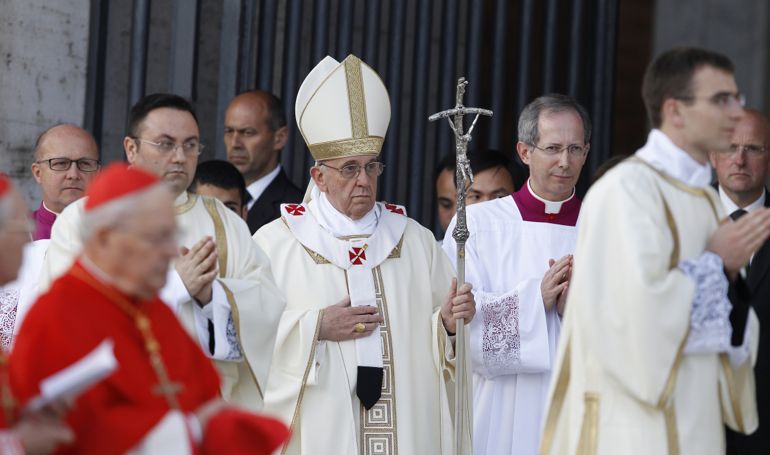
Pope Francis arrives to celebrate Mass marking the feast of Corpus Christi outside the Basilica of St. John Lateran in Rome (CNS photo/Paul Haring)
One of themes Pope Francis repeatedly returns to in his talks and spiritual reflections is the idea of solidarity – a global solidarity, rich and poor, stemming from the recognition of being children of God. He sees the church as the instrument of building this recognition and then drawing humanity together.
This recognition, he insists, is not without responsibility. We are all required to live in solidarity with each other, rich and poor. This means caring for each other. Those with resources have a particular responsibility to “feed” those without such resources.
Francis returned to his “solidarity” theme in his Corpus Christi homily Sunday. The following is an excerpt from his homily.
The multiplication of the loaves [is born of] Jesus' invitation to his disciples: 'Feed them yourselves', 'give', share. What do the disciples share? What little they have: five loaves and two fishes. But it is precisely those loaves and fishes that, in God’s hands, feed the whole crowd. And it is precisely the disciples, bewildered by the inability of their means, by the poverty of what they have at their disposal, who invite the people to sit down and— trusting Jesus' word of—distribute the loaves and fishes that feed the crowd. This tells us that in the Church, but also in society, a keyword that we need not fear is 'solidarity', that is, knowing how to place what we have at God’s disposal, our humble abilities, because only in sharing them, in giving them, that our lives will be fruitful, will bear fruit. Solidarity: a word upon which the spirit of the world looks unkindly!”
“Tonight, once again, the Lord gives us the bread which is his body. He makes a gift of himself. We also experiencing “God's solidarity” with humanity, ... a solidarity that never ceases to amaze us. God draws near to us. In the sacrifice of the Cross He lowers himself, entering into the darkness of death in order to give us his life, which conquers evil, selfishness, and death. This evening too, Jesus gives himself to us in the Eucharist. He shares our journey, or rather, He becomes food, real food that sustains our lives even at the times when the going is rough, when obstacles slow our steps. In the Eucharist, the Lord makes us follow his path, the path of service, sharing, and giving—and what little we have, what little we are, if shared, becomes wealth, because the power of God, which is love, descends into our poverty to transform it.”
“Discipleship, communion, and sharing. Let us pray that our participation in the Eucharist may always inspire us: to follow the Lord every day, to be instruments of communion, to share what we are with Him and with our neighbor. Then our lives will be truly fruitful.”
